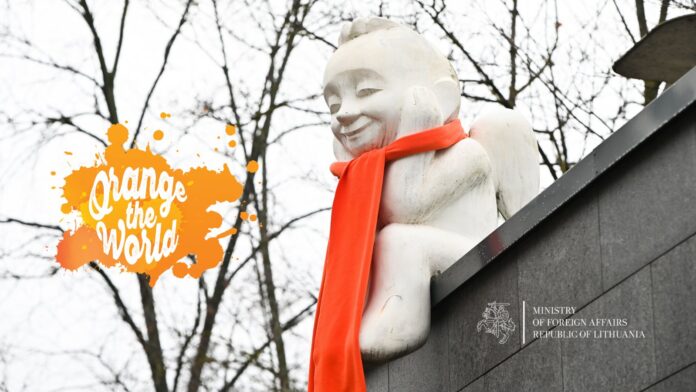
Awareness promoted on Elimination of Violence against Women Day
The Lithuanian Social Security and Labour Ministry called on organizations to illuminate their buildings in orange and people to wear orange to show their intolerance of violence against women on the International Day for the Elimination of Violence against Women on November 25.
“Violence against women and girls is one of the world’s most systematic and widespread human rights violations,” said Rugile Butkevičiūtė, program manager with the Women’s Issues Information Centre, noting that violence against women is an effective way of controlling them, preventing them from fully participating in society, achieving their goals and expressing their opinions. It is impossible to calculate exactly how many women are subjected to domestic violence, according to Butkevičiūtė, but the global figure is about 25-30 percent.
In a public opinion poll commissioned by the Women’s Issues Information Center, more than 23 percent of Lithuanian women said they had experienced violence. Statistics from the Lithuanian Police Department show that more than 58,000 reports of domestic violence were received in the country last year, and the majority of victims were women.
According to the World Bank, violence against women aged 15 to 44 years causes more deaths and more severe disabilities than cancer, traffic accidents, malaria and war combined.
On November 25, Viktorija Čmilytė-Nielsen, speaker of the Lithuanian parliament, invited people to join 16 Days of Activism Against Gender-Based Violence, an international campaign to end violence against women and girls. Launched 30 years ago, the global campaign runs from November 25, the International Day Against Violence Against Women, to December 10, International Human Rights Day.
“Almost every day in Lithuania we hear about cases of violence against women; unfortunately, tragic stories ending in death are still being reported,” Čmilytė-Nielsen said in a press release. “Last year, there were over 58,000 reports of domestic violence and the vast majority of the victims were women.”
The speaker noted that many cases of physical, psychological, sexual and economic violence remain unreported. “We must ensure that such violence is recognized and that victims are not afraid to speak out and are not blamed,” she said. According to Čmilytė-Nielsen, ratification of the Istanbul Convention would show that Lithuania has become a mature country.
The speaker said earlier in the autumn that ratification of the Istanbul Convention should only be put up for debate in the parliament when there are enough votes in favour. Former Lithuanian president Dalia Grybauskaitė submitted the convention to the Seimas for ratification years ago, but the process has stalled due to political disagreements on certain clauses of the document.
Experts from the Council of Europe say Lithuania could benefit from advice on curbing domestic violence. The Catholic Church and some politicians say, however, that the Convention could lead Lithuania to change its concept of gender and introduce unacceptable provisions on homosexuality. This has recently been a source of conflict within the government.
Lithuania Daily News Bulletin



























